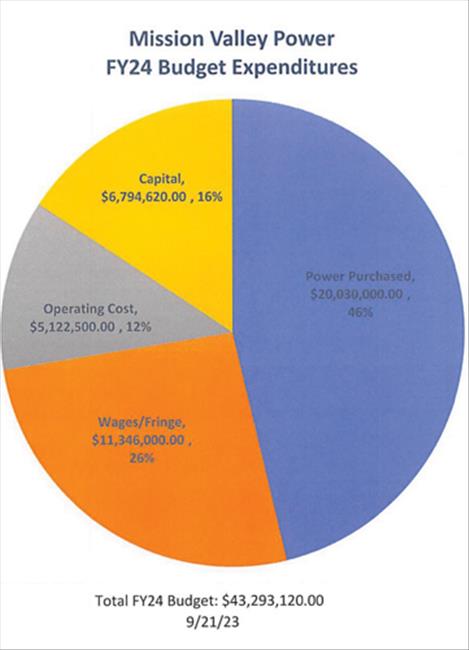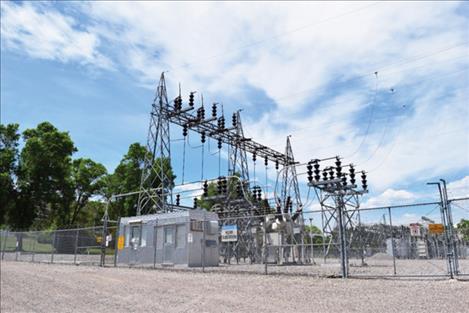MVP secures federal funds to lessen impacts of rate increase, strengthen area reliability
Hey savvy news reader! Thanks for choosing local.
You are now reading
2 of 3 free articles.
News from Mission Valley Power
PABLO — Mission Valley Power (MVP) is a federal utility managed by the Confederated Salish and Kootenai Tribes (CSKT) under the authority of PL 93-638, the Indian Self-Determination Act. MVP is a non-profit utility. This year, MVP qualified for funding under the Bipartisan Infrastructure Law or BILS act, to help defray the cost of important system improvements.
MVP participated in a capital assessment project, which evaluated the useful life and condition of all substation assets on the MVP system. This ten-year comprehensive review cost ratepayers $250,000 and serves as a road map for future system improvements. Many local utilities do not have comprehensive system assessments and as a result, many utilities set customer retail rates in a vacuum without the benefit of the system review.
The review, completed in September 2021, provided the necessary information to position the utility to receive $5 million in BILS funding from 2022 – 2026. The BILS funding is a grant from the Department of Interior, Bureau of Indian Affairs, and is not rate based. While the federal contributions are greatly appreciated, local ratepayers will pay for many of the costs of system repairs for continued system reliability and sustainability.
Unlike some regional utilities such as Northwestern Energy, MVP is a non-profit utility. Non-profit utilities do not pay shareholder dividends and all revenues collected are invested in the utility.
Over 46% of the MVP annual budget is dedicated to wholesale purchased power from the Bonneville Power Administration (BPA); 26% is allocated for staff wages and fringe. MVP staff members belong to the IBEW Union, and those wages are adjusted annually, like other union utility organizations. This past July union wages were increased by 6%. Administration and operations expenses account for approximately 12% of the budget. Capital costs account for approximately 16% of the budget.
While wages are adjusted annually, the largest increases experienced by MVP are related to increased costs of fuel, materials, and equipment. In the last five years, MVP has seen increases in all categories of equipment, especially in the cost of transformers, conduit, wire and poles. Forty-foot poles, which are a high use utility material, have increased in cost by 57%.
Other materials such as 3-inch PVC conduit have increased in cost by 363% over the past 5 years.
Material availability and supply chain issues are plaguing all utilities across the Northwest. MVP has seen delays in materials and product increases in costs as materials are procured in one year and delivered years later.
One of the federal BILS funded projects is the replacement of transformers at the Kerr Substation. The 2021 estimate to replace the transformers and upgrade the equipment at the Kerr Substation was $5.3 million. The good news is that the BILS funding will provide $2 million toward the project. Unfortunately, inflation and materials inflationary costs will likely increase the original cost of $5.3 million by at least 15.1% or more (projected wages and materials inflationary increases) before the project is completed. It takes an estimated two years to procure the transformer, at a cost of $2.1 million.
Projects earmarked for the BILS federal funding include the Kerr Substation, West Shore Substation, and the Finley Point Substation. From 2022–2027, MVP will receive a total of $5 million.
The proposed January 2024 rate increase will be used as follows: (1) to increase the capital reserves so inflationary increases do not stop critical projects for sustained system reliability; (2) to address the five substation assets determined to be in very poor and poor condition where the federal government contributed a portion of the cost to repair and replace them; and (3) to increase the investments in deferred maintenance. All balances accumulated will go towards shoring up our emergency reserves that can help protect us from unforeseen impacts such as government shutdowns, wildfire damage, ice storms, etc.
The proposed rate increase will increase all rate classes by an average of 18%, with a proposed effective date of January 2024. Some rate classes will see a larger increase, while other rate classes will not be increased as much.
Under the rate proposal, the residential rate class monthly basic charge will be adjusted from $17.50 per month, to $22 per month. The monthly increase to $22 is less than the surrounding power utilities in Kalispell and Missoula. The residential rate class is the largest rate class at Mission Valley Power.
The irrigation class monthly basic charge will increase from $5 per month to $10 per month. All rate classes will see increases in demand charges and kWh charges, as well.
Mission Valley Power makes the rate recommendations and the MVP Consumer Council, an advisory board, seeks public input and holds a public hearing. Details of those deadlines will be forthcoming.
Any customer who wants to review the DOI, BIA Deferred Maintenance Report, which assessed the substation assets at MVP, may come into the Pablo MVP Office and view the study. A September 2023 rate recommendation binder is available to the public. It includes the DOI, BIA system assessment, the actual rate study document, and several utility comparisons with surrounding utilities.
Customers may submit written comments on the proposed rate increases to MVP Attn: Addie Hout, PO BOX 97, Pablo, MT 59855. Specific questions may be addressed to Zachary Conko-Camel, MVP General Manager, at email address camel.z@missionvalleypower.org. If a community group wants a presentation on the proposed rate increase, arrangements will be made.
Continued reliable service is the goal and MVP will continue to seek funding that is not rate based, that continues to meet the needs of all customers alike.

















